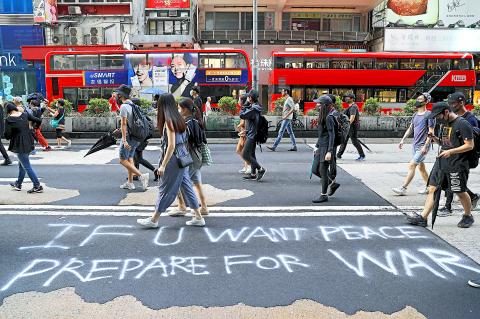Molotov cocktails were yesterday thrown inside a Hong Kong metro station, but no one was injured, the government said, as pro-democracy protesters again took to the streets angry at what they believe is Beijing’s tightening grip on the territory.
The Kowloon Tong station was seriously damaged in the attack, the Hong Kong government said in a statement.
Hundreds of protesters, many young and wearing masks, were marching in Kowloon at the time and were headed to a district near the Kowloon Tong station.

Photo: AP
About a dozen riot police took to the streets in Kowloon’s Tsim Sha Tsui district, normally a haven for local and international shoppers, behind the marchers shortly after news of the Molotov attack.
Hong Kong’s metro has borne the brunt of protests, with stations torched and trashed, and only returned to normal operations on Friday after being completely shut down.
The metro normally carries about 5 million people a day.
Hong Kong’s protests started in opposition to a now-abandoned extradition bill, but have mushroomed in four months into a pro-democracy movement and an outlet for anger at social inequality in the territory.
The protests have plunged the territory into its worst crisis since the UK handed it back to China in 1997 and is the biggest popular challenge to Chinese President Xi Jinping (習近平) since he came to power in 2012.
Hong Kong had experienced relative calm since last weekend, when a peaceful march by tens of thousands spiraled into a night of running battles between protesters and police.
Since then there had only been small nightly protests and advocates had not flagged any major action this weekend.
A small group calling itself the “Silver-Haired Marchers” yesterday began a 48-hour sit-in at police headquarters, describing themselves as “old, but not obsolete.”
“Whilst we may not be able to fight alongside the young protesters in the front line against an unjust government, escalating police violence and indiscriminate arrests, we take it to heart to uphold the core values of Hong Kong and defend the future of our younger generations,” it said in a statement.
Colonial-era emergency laws were introduced a week ago banning masks at public rallies, sparking some of the worst violence since the protests started. Protesters use masks to shield their identities.
However, hundreds of people, including schoolchildren and office workers, have since defied the ban and wore masks.
A group of protesters planned a “mask party” yesterday night.
Hong Kong police, once praised as “Asia’s finest,” are also facing a crisis of confidence amid the worsening political tensions.
Protesters accuse them of using excessive force, a charge police deny, and two protesters have been shot and wounded during skirmishes with police.

PREPAREDNESS: Given the difficulty of importing ammunition during wartime, the Ministry of National Defense said it would prioritize ‘coproduction’ partnerships A newly formed unit of the Marine Corps tasked with land-based security operations has recently replaced its aging, domestically produced rifles with more advanced, US-made M4A1 rifles, a source said yesterday. The unnamed source familiar with the matter said the First Security Battalion of the Marine Corps’ Air Defense and Base Guard Group has replaced its older T65K2 rifles, which have been in service since the late 1980s, with the newly received M4A1s. The source did not say exactly when the upgrade took place or how many M4A1s were issued to the battalion. The confirmation came after Chinese-language media reported

A Ministry of Foreign Affairs official yesterday said that a delegation that visited China for an APEC meeting did not receive any kind of treatment that downgraded Taiwan’s sovereignty. Department of International Organizations Director-General Jonathan Sun (孫儉元) said that he and a group of ministry officials visited Shenzhen, China, to attend the APEC Informal Senior Officials’ Meeting last month. The trip went “smoothly and safely” for all Taiwanese delegates, as the Chinese side arranged the trip in accordance with long-standing practices, Sun said at the ministry’s weekly briefing. The Taiwanese group did not encounter any political suppression, he said. Sun made the remarks when

The Taiwanese passport ranked 33rd in a global listing of passports by convenience this month, rising three places from last month’s ranking, but matching its position in January last year. The Henley Passport Index, an international ranking of passports by the number of designations its holder can travel to without a visa, showed that the Taiwan passport enables holders to travel to 139 countries and territories without a visa. Singapore’s passport was ranked the most powerful with visa-free access to 192 destinations out of 227, according to the index published on Tuesday by UK-based migration investment consultancy firm Henley and Partners. Japan’s and

BROAD AGREEMENT: The two are nearing a trade deal to reduce Taiwan’s tariff to 15% and a commitment for TSMC to build five more fabs, a ‘New York Times’ report said Taiwan and the US have reached a broad consensus on a trade deal, the Executive Yuan’s Office of Trade Negotiations said yesterday, after a report said that Washington is set to reduce Taiwan’s tariff rate to 15 percent. The New York Times on Monday reported that the two nations are nearing a trade deal to reduce Taiwan’s tariff rate to 15 percent and commit Taiwan Semiconductor Manufacturing Co (TSMC, 台積電) to building at least five more facilities in the US. “The agreement, which has been under negotiation for months, is being legally scrubbed and could be announced this month,” the paper said,